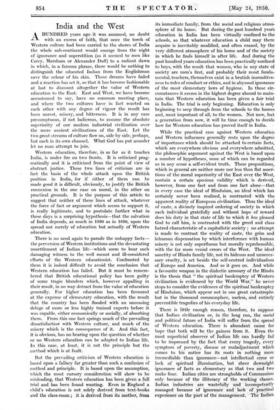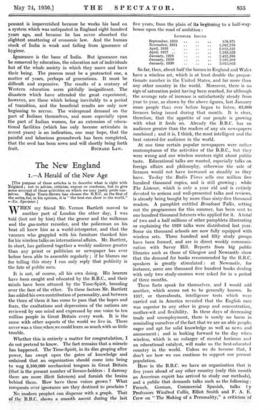India and the West
AHUNDRED years ago , it was assumed, no doubt with an excess of faith, that once the torch of Western culture had been carried to the shores of India the whole sub-continent would emerge from the night of ignorance and superstition (as it seemed to men like Carey, Marsham or Alexander Duff) to a radiant dawn in which, in, a famous phrase, there would be nothing to distinguish the educated Indian from the Englishman save the colour of his skin. Those dreams have faded and a reaction has set it, so that it has become fashionable at last to discount altogether the value of Western education to the East. East and West, we have become accustomed to say, have no common meeting place, and where the two cultures have in fact reacted on each other with any degree of vigour the result has been unrest, misery, and bitterness. It is in any case presumptuous, if not ludicrous, to assume the absolute superiority of our modern industrial civilization over the more ancient civilizations of the East. Let the two great streams of culture flow on, side by side, perhaps, but each in its own channel, What God has put asunder let no man attempt to join.
Western education, therefore, in so far as it touches India, is under fire on two fronts. It is criticized prag- matically and it is criticized from the point of view of abstract justice. These two lines of criticism are -iii fact the basis of the whole attack upon the British position in India, for if either of them can be made good it is difficult, obviously, to justify the British connexion in the one case on moral, in the other on practical grounds. It is the purpose of this article to suggest that neither of these lines of attack, whatever the force of fact or argument which seems to support it, is really legitimate, and to postulate - further what in these days is a surprising hypothesis—that the salvation of India depends, as much in -1930 as in 1830, upon the spread not merely of education but actually of Western education.
- There is no need again to parade the unhappy facts— the perversion of Western institutions and the devastating unsettlement of Indian life—which -seem to bear such damaging witness to the -well meant and ill-considered efforts of the Western educationist. Confronted by them it is indeed difficult to avoid the conclusion that Western education has failed. But it must be- remem- bered that British educational policy has been 'guilty of some tragic blunders which, however appalling in their result, in no way detract from the value of education generally. For higher education has been favoured at the expense of elementary education, with the result that the country has been flooded with an unceasing deluge of more or less highly trained experts before it was capable, either economically or socially,- of absorbing them. From this one fact springs much of the prevailing dissatisfaction with Western culture, and much - of the misery which is the consequence of it. And this fact, it is obvious, has no bearing upon the question of whether Or no Western education can be adapted to Indian life. In this case, at least, it is not the principle but the method which is at fault.
But the prevailing, criticism of Western education is based upon a. fallacy far greater than such a confusion of method and principle. It is based upon the assumption; which the most cursory consideration will show to be misleading, that Western education has been given a full trial and has been found wanting. Even in England a child's education is not solely derived from text-books and the class-room ; it is derived from its mother, from its inimediate familY, from the Social and religious atmci. sphere of its home. But during the past hundred years education hi India has been virtually confined to the schools, so that whatever education a child may there acquire is inevitably modified, and often erased, by the very different atmosphere of his home and of the society in which he finds hiniself in after life. And during the past hundred years education has been practically confined to boys, with the result that women, who in any state of society are men's first, and probably their most funda- mental, teachers, themselves exist in a brutish insensitive- ness to rules of conduct or ethics, and in abysmal ignorance of the most elementary laws of hygiene. In these cir- cumstances it seems.in the highest degree absurd to main- tain that Western education has been given a fair trial in India. The trial is only beginning. Education is only beginning to seep through from the schools to the homes and, most important of all, to the women. Not now, but a generation from now, it will be time enough to decide how far Western education has proved itself in India.
While the practical case against Western education and Western influences generallY rests upon the degree of importance which should be attached to certain facti, which are everywhere obvious and everywhere admitted, the philosophic argument against the West is based upon a number of hypotheses, none of which can be regarded as in any sense a self-eVident truth. TheSe propositions, which in general are neither more nor less than flat asser- tions of the moral superiority of the East over the West, contain a certain specious validity Which is derived, however, from one fact and -from one fact alone—that in every case the ideal of Hinduism, an ideal which haS certainly never been realized, is contrasted - with -the apparent reality of European civilization. Thus the ideal of caste, a divinely inspired ordering of society in which each individual gratefully and -without hope - of reward does his duty in that state of life to which it has pleased God to call him, is contrasted with the greed and class hatred characteristic of a capitalistic society ; no attempt is made to contrast the reality of caste, the grim and inhuman dispensation by which interference with human misery is not only superfluous but morally reprehensible,' with the far more venial errors of the West. The ideal sanctity of Hindu family life, not its hideous and anneces= sary cruelty, is set beside the self-centred individualism of Europe and America. And so it goes on. And while a favOurite weapon in the dialectic armoury of the Hindu is the thesis that 4 the spiritual bankruptcy of Western Civilization is evidenced by the World War,". he never to consider the'evidences of the spiritual bankruptcY of Hinduism, which appear not in one great catastrophe but in the thousand commonplaae, nseleis, and entirely preventible tragedies of his everyday life: There is little enough reason, therefore, to suppose that Indian civilization or, in the long run,. the social and political future of India will suffer from the spread of Western edueation. There is abundant cause for hope that both will be the gainers from it. Even the Most superficial observer of Indian life can hardly fail to be impressed by the fact that every tragedy, every symptom of poverty, disease or maladjustment which conies to his notice has its roots in nothing more irremediable than ignorance—not intellectual error or lack of spiritual illumination, but sheer downright -ignorance of faetS as elementaiy as that two and two make four. Indian cities are strongholds of Communism only • because of the illiteracy of the working classeS. Indian industries are wastefully and incompetently managed because of ignoranee and lack of practical experience on the part of the management. The Indiat peasant is impoverished because he works his land on a system which was antiquated in England eight hundred years ago, and because he has never absorbed the slightest smattering of economic law. And the human stock of India is weak and failing from ignorance of hygiene..
Ignorance is the bane of India. But ignorance can be removed by education, the education not of individuals but of the whole society in which they move and have their being. The process must be a protracted one, a matter of years, perhaps of generations. _It must be difficult and expensive. The results of a century of Western education seem pitifully insignificant. The disasters which have attended the great experiment, however, are those which belong inevitably to a period of transition, and the beneficial results are only now beginning to accrue. The widespread demand on the part of Indians themselves, and more especially upon the part of Indian women, for an extension of educa- tional facilities (which has only become articulate in recent years) is an indication, one may hope, that the painful and laborious groundwork has been completed, that the seed has been sown and will shortly bring forth







































 Previous page
Previous page